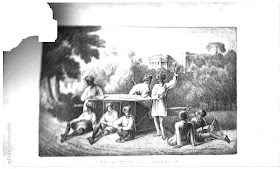I have been a regular visitor to Neha’s blog for a long time now and enjoy her lively posts. But every now and then she indulges in what she labels as poetry and I can’t make head or tail of what she is trying to say ( example, here) .To me, poems are about rhymes. If that’s missing, I may still like the piece, but I will not accept it as poetry. It’s like playing tennis without the nets, as Robert Frost is supposed to have said
Writing about the inventor of ‘vers libre’ or ‘free verse’ style that was gaining currency a hundred years ago, P.G.Wodehouse lamented:
" It is too early yet to judge the full effects of this man's horrid discovery, but there is no doubt that he has taken the lid off and unleashed forces over which none can have any control. All those decent restrictions which used to check poets have vanished, and who shall say what will be the outcome? Not only are rhymes no longer necessary, but editors positively prefer them left out. If Longfellow had been writing today he would have had to revise "The Village Blacksmith" if he wanted to pull in that dollar a line. No editor would print stuff like:
Under the spreading chestnut tree
The village smithy stands.
The smith a brawny man is he
With large and sinewy hands.
If Longfellow were living in these hyphenated, free and versy days, he would find himself compelled to take his pen in hand and dictate as follows:
In life I was the village smith,
I worked all day
But
I retained the delicacy of my complexion
Because
I worked in the shade of the chestnut tree
Instead of in the sun
Like Nicholas Blodgett, the expressman.
I was large and strong
Because
I went in for physical culture
And deep breathing
And all those stunts.
I had the biggest biceps in Spoon River.
Who can say where this thing will end? _Vers libre_ is within the reach of all. A sleeping nation has wakened to the realization that there is money to be made out of chopping its prose into bits."
I agree with PGW. Any time, regular or prime, don’t commit crime of giving me poems, however sublime, that don’t rhyme.
